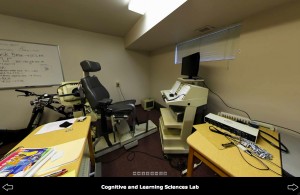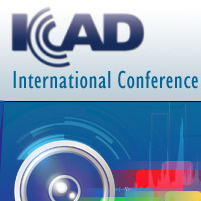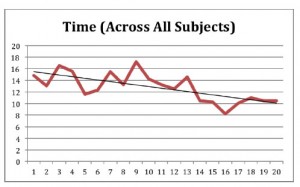
Michigan Tech has launched a new virtual tour of campus and the local area. The Harold Meese Center is included among the virtual walking tours. There are interactive panoramas of Cognitive and Learning Sciences Labs as well.

Michigan Tech has launched a new virtual tour of campus and the local area. The Harold Meese Center is included among the virtual walking tours. There are interactive panoramas of Cognitive and Learning Sciences Labs as well.

Assistant Professor Myounghoon “Philart” Jeon (CLS) presented a paper, “Science or art? Sonification in the age of biocybernetic reproduction: A case study of the accessible aquarium project,” at the 19th International Conference on Auditory Display (ICAD 2013) in Poland, July 6-10.
From Tech Today.

Edward Cokely (CLS) has been awarded a $49,866 research grant for “CAREER: Numeracy and Risk Literacy” by the National Science Foundation. This is the first year of a five-year project totaling $451,566.
From Tech Today.
CAREER: The Faculty Early Career Development (CAREER) Program is a Foundation-wide activity that offers the National Science Foundation’s most prestigious awards in support of junior faculty who exemplify the role of teacher-scholars through outstanding research, excellent education and the integration of education and research within the context of the mission of their organizations. Such activities should build a firm foundation for a lifetime of leadership in integrating education and research. NSF encourages submission of CAREER proposals from junior faculty members at all CAREER-eligible organizations and especially encourages women, members of underrepresented minority groups, and persons with disabilities to apply.
Read more at NSF.

Basketball Players Earn Academic Honors
Michigan Tech had 18 student-athletes named to the 2012-13 Great Lakes Intercollegiate Athletic Conference Winter All-Academic and All-Academic Excellence Teams recently.
All-Academic Teams are comprised of those student-athletes who meet the criteria and carry a cumulative GPA of 3.0-3.49. All-Academic Excellence Teams are comprised of student-athletes who have a cumulative GPA of 3.50-4.0.
In Women’s Basketball, Psychology Senior Emma Veach from Grand Haven, Michigan, was part of the All-Academic Excellence Team.
Read more at Tech Today, by Ian Marks.
 Ten New Faculty Members Hired in SFHI: Water Systems and Future Transportation Systems
Ten New Faculty Members Hired in SFHI: Water Systems and Future Transportation Systems
Michigan Tech has hired ten new faculty members as part of the University’s most recent Strategic Faculty Hiring Initiatives (SFHI), which were conducted in parallel over the last two years. The research done by six of the new hires focuses on the cross-disciplinary theme of water systems. The other four new faculty members conduct research in future transportation systems.
Myounghoon “Philart” Jeon earned his PhD in Engineering Psychology from Georgia Tech in 2012 and joined the Department of Cognitive and Learning Sciences as assistant professor. His research areas encompass auditory displays, affective computing, assistive technologies and automotive interface design. His research has yielded more than 70 publications across various journals and conference proceedings. Previously, Jeon worked at LG Electronics and was responsible for all of their automotive user interface and sound designs. In addition, Jeon has led many other industry projects in collaboration with Toyota, Hyundai-Kia Motors, General Electric, Samsung Electronics and Panasonic Automotive, etc. His works have been recognized by awards such as the IF Communication Design Award and the Korean Ergonomic Design Award.
Read more at Tech Today, by the Office of the Provost and Vice President for Academic Affairs.
A research outreach project at RiskLiteracy.org, which is headed by Edward Cokely (CLS), was recently featured in a New Scientist article entitled, “Hidden talent: What’s your superpower?” Visit newscientist.com for the shortened article.
From Tech Today.
 The psychology undergraduates at Michigan Tech have published their research as Volume 1 of the Journal of Midwest Undergraduate Behavioral Research (JMUBR).
The psychology undergraduates at Michigan Tech have published their research as Volume 1 of the Journal of Midwest Undergraduate Behavioral Research (JMUBR).
The research is the outcome of a two-semester series of upper-level courses (PSY 3000/3001 Experimental Methods and Statistics I and II) required for the Bachelor of Science degree in Psychology. The courses in 2012-13 were taught by Assistant Professor of Psychology Shane Mueller.
Research topics were selected by students during Fall 2012, which they saw through from initial concept, two rounds of experimentation (including IRB approval, data collection, and analysis), and final documentation. The educational goal it serves is to motivate the students to think beyond “school” projects, to gain experience doing research, and to write for an audience beyond their classroom. Also, it allows their hard work to get broader exposure, potentially having an impact on the field and yielding concrete material on their vitae/resume for graduate schools and employers to view.
Some highlights from Volume 1 of JMUBR, which is edited by Shane Mueller.
* Two different projects examined the cognitive and personality factors of marijuana users, surveying hundreds of self-identified users, and finding little impact of frequency of use on impulsivity, short-term memory, reaction time, or executive function.
* Two research projects examined how real or perceived task difficulty interacted with personality factors. A third project examined whether physical stressors impacted the perceived or actual difficulty of cognitive tasks.
* Several groups examined very applied problems:
Take a look and see what they have accomplished.
The Use of Infographics to Increase Awareness of Student Debt
James N. Greydanus
Michigan Technological University
Department of Cognitive and Learning Sciences
Kristyna J. MacKinnon
Michigan Technological University
Department of Cognitive and Learning Sciences
The Influence of Positive and Negative Verbal Feedback on Task Productivity and Self-Evaluation
Rachel Franchock
Robert Damico
Michigan Technological University
Department of Cognitive and Learning Sciences
Houghton, MI 49931 USA
Assessing Reasons for College Students’ Attendance and Participation in Class
Victoria Hanus
Madeline Peabody
Department of Cognitive and Learning Sciences
Houghton, MI 49931 USA
Marijuana’s Effect on Reaction Time and Response Accuracy
Nick Gravlin
Department of Cognitive and Learning Sciences
Houghton, MI 49931 USA
Assessing the Effects of Physical Demands on Mental Performance
Rachael Huff
Elizabeth Nigro
Department of Cognitive and Learning Sciences
Houghton, MI 49931 USA
The Effects of Music and Environmental Noise on Reading Comprehension
Thomas Gemignani
Department of Cognitive and Learning Sciences
Houghton, MI 49931 USA
Failure Events and their Effect on the Stability of Personality Self-Assessments
William Lehman
Abbey Westphal
Department of Cognitive and Learning Sciences
Houghton, MI 49931 USA
The Effects of Eating Healthy and Unhealthy Food on Recognition Skills
Macy McDonnell
Michael Way
Department of Cognitive and Learning Sciences
Houghton, MI 49931 USA
Assessing Impulsive Personality traits and Short-term Memory Among Self-reported Marijuana Users
Alysa Cherubini
Department of Cognitive and Learning Sciences
Houghton, MI 49931 USA
The Effects of Attentional Cuing and Input Methods on Reaction Time in Human Computer Interaction
Brad Nelson
Michigan Technological University
Fall 2012 4.00
Huff, Rachael M JR SPSY
Shull, Catherine E FR SPSY
Veach, Emma G SR SPSY
Fall 2012 3.99-3.50
Bokor, David T SR SPSY
Cherubini-Sutinen, Alysa R JR SPSY
Deane, Katrina E JR SPSY
Dunham, Charles L SR SPSY
Evans, Zachary R FR SPSY
Harter, Kayla R SO SPSY
Lehman, William E JR
Mauer, Tessa K SR SPSY
Nelson, Bradley D SR SPSY
Nigro, Elizabeth A SR SPSY
Santerre, Cassaundra D SO SPSY
Westphal, Abbey M SR SPSY
Invited Speaker: Peter Hancock, Provost Distinguished Research Professor, University of Central Florida, Orlando
Title: How Technology Transports us to a New Realm of Being.
Location: Memorial Union Ballroom (MUB) A1
Time: 2:05-3:00pm, Monday, April 22, 2013
Abstract: I will present three narratives concerning the etiology of disaster. They will each contain salient signposts as to the way in which technology, imagination, and inspiration both coalesce and fail. I shall then look to weave together a common pattern of these and similarly failed technologies to articulate the link between aspiration and technical innovation. I shall point to some explicit connections between the specific stories I have presented and then look to extrapolate much wider principles under the general title of “Transports of Delight.” The latter is the title of a text that I am currently in the process of creating.
 Psychology alum Corey LaBissoniere has published his first novel, Land of Enchantas. The story makes reference to local mining history. LaBissioniere is a member of the Upper Peninsula Authors and Publishers and a brother of the Zeta Epsilon Chapter of Sigma Phi Fraternity.
Psychology alum Corey LaBissoniere has published his first novel, Land of Enchantas. The story makes reference to local mining history. LaBissioniere is a member of the Upper Peninsula Authors and Publishers and a brother of the Zeta Epsilon Chapter of Sigma Phi Fraternity.
Read more at the Michigan Tech Lode, by Katelyn Waara.